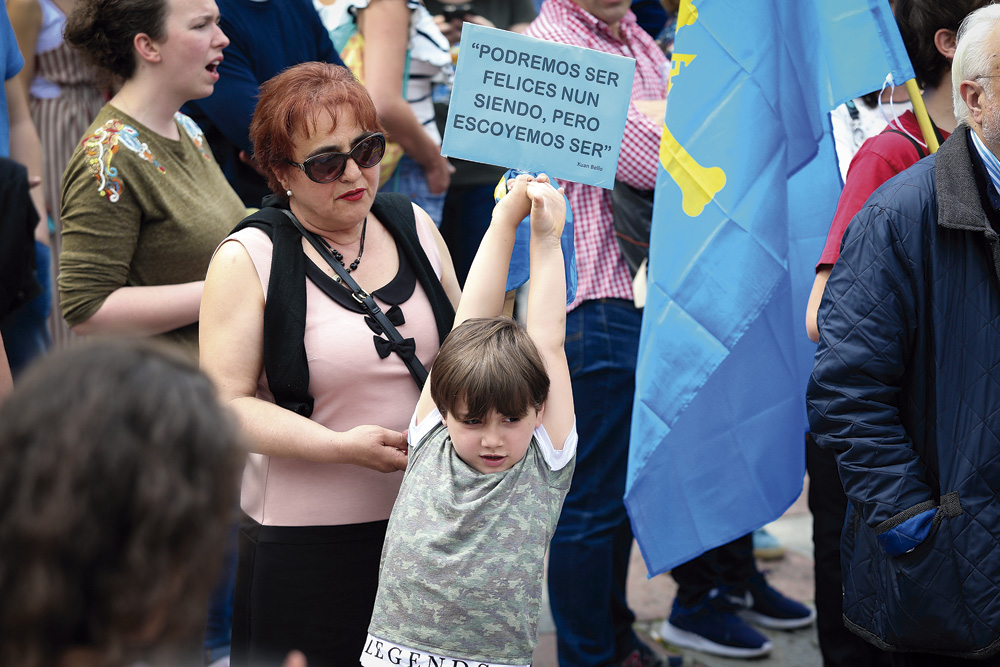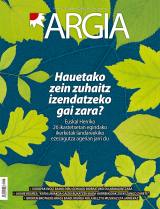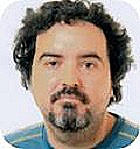"As for the Asturian, the linguistic awareness is increasing"
- On 21 April, thousands of Asturians claimed in Oviedo the officiality for the Asturian. It has achieved great social and political support in recent years. The PSOE of Asturias, in the last congress of the party, has opted for the officiality as it had never done before. This decision may give rise to a statutory reform. Inaciu Galán is president of the Pol Asturianu Initiative and tells us about the progress of the Asturian.

Thousands of Asturians gathered you at the demonstration. What assessment have you made?
It has been one of the most important so far, and also the most cross-cutting. It is the first time since 1976 that the PSOE has participated explicitly in the Congress of Deputies. There have always been offices and representatives in favour of the Asturian, but on this occasion, in the October Congress of the party it was shown that the Asturian’s official status was going to be one of its objectives. The fact that the PSOE visits the demonstration for the first time is historic, since it has ruled almost always in Asturias in the autonomous era. On the other hand, it has been very numerous, at a key moment. It is key because there is a sufficient majority to initiate a process of statutory reform and to demand the official status.
Can anything be achieved before the end of this term of office?
In the last elections, 17 of the 45 deputies were in favour of the official, those of Podemos, IU and Foro Asturias (Francisco Álvarez – Cascos party). The Socialist militants have on more than one occasion demonstrated their position in favour of the Government, but the leaders of the party had a great deal of power and never put forward their proposals, even if they were in favour of some Asturian socialist president. It has been achieved in the present Congress.
Therefore, the PSOE will facilitate the path to investiture.
Now there's another problem. I believe that in the Socialist Parliamentary Group there is no Member who is not a Vice-President [Susana Díaz, President of the Andalusian Board]. They are elected by the Asturian President, Javier Fernández. Fernandez insists on his opposition to the government. Let us therefore say that the party is now in favour, but the group of Members is not. It is therefore difficult to do anything in this legislature.
Do you have any hope for the forthcoming elections?
There are now four parties in favour of the Government: Podemos, PSOE, Foro Asturias and IU. Among the four, they could obtain about 27 Members in the May 2019 elections and start the process of reform of the Statute. They will, of course, have to discuss the official model, the deadlines, etc. The request and the answer will be transferred from the Asturias Parliament to Madrid, where, for example, several years can be elapsed.
The greater consensus between the parties, the position of pp, including the president of pp in Asturias, is even more extreme. President Mercedes Fernández was in favour in 1998 and now against. The PSOE was then opposed to the official role. In any case, we think it is a matter of leaders, we do not believe that the militancy of pp is against, nor do the councillors of the municipalities.
To what extent does the current status of the Asturian protect the speakers?
To put it somewhat, the situation is similar to the mixed area of Navarra. Citizens can do so in the administration in Asturian, orally and in writing, but the administration is not obliged to do so.
In the education system, he defends being at all levels, from Early Childhood Education to University. In Primary you have to choose between the subjects of Asturian or Asturian culture, which are taught in Spanish; as if the language and culture could be divided so firmly. The collapse of Compulsory Secondary Education is enormous. The Asturian is an optional subject and competes with the French, among others. It is absurd to confront the native language with another language.
If the official status is achieved, it will be necessary to discuss what model to follow. Teach several subjects in Asturian, follow the Basque system... There will be debate, but at least one of the subjects will be Asturian and once the studies are completed, the students will be able to speak and write in Asturian.
"In ten primary schools the Asturian language has been the main axis, that is, subjects have been taught several hours a week in Asturian. It was a revolution!
In the course that is being completed, a pilot experience has been carried out in the schools.
In Primary Education ten centers have had as their axis the Asturian language, that is, they have learned several hours a week subjects in Asturian. It's been a great revolution. Children get better grades, as they have learned the natural sciences in their language and have been able to call trees and animals in their language. A further ten schools will be set up in the new school year. Pp has brought the plan to the courts of justice of Catalonia.
The III was held in 2017. The Sociolinguistic Survey was published. What would you highlight from the results?
Compared to previous results, perception of language has improved. For example, 53 per cent are in favour of the official position, compared with 18 per cent against it. Now more people say that the Asturian is a speaker, and it's amazing because we perceive that use has gone down. That means, therefore, that language awareness has increased. It's the ability to write another piece of data that has greatly increased. Many more Asturians have said that this time he is able to write. Schools and courses for adults have proved their effectiveness.
Are we talking less now, and at the same time are young people more linguistically aware?
The current generations, more or less, live the Asturian normally. They use less, but the prefixes are gone. My grandparents experienced a direct repression in Franco for using the Asturian. They have that stigma. There were no speeches to answer. I say to my grandmother that in Parliament there are Members who do in Asturian and are frightened, ‘how will the people of that level use the language that is used in the kitchen?’. That is what it says.
Another thing is that of young people. Today, in 2018, things happen that I can't believe. I am a high school teacher and I teach the Asturian lesson. Most students speak Asturian in their day-to-day. Well, there's more than one teacher at school who tells you not to speak Asturian, which is to speak badly. I am ashamed to say that, but it is true. You try to raise the self-esteem of the students, alphabetize them and then experience situations of this kind. However, today they have a lot of information and, unlike before, they don't silence and respond. They know they have rights and they know that things are not the way those teachers told us.













